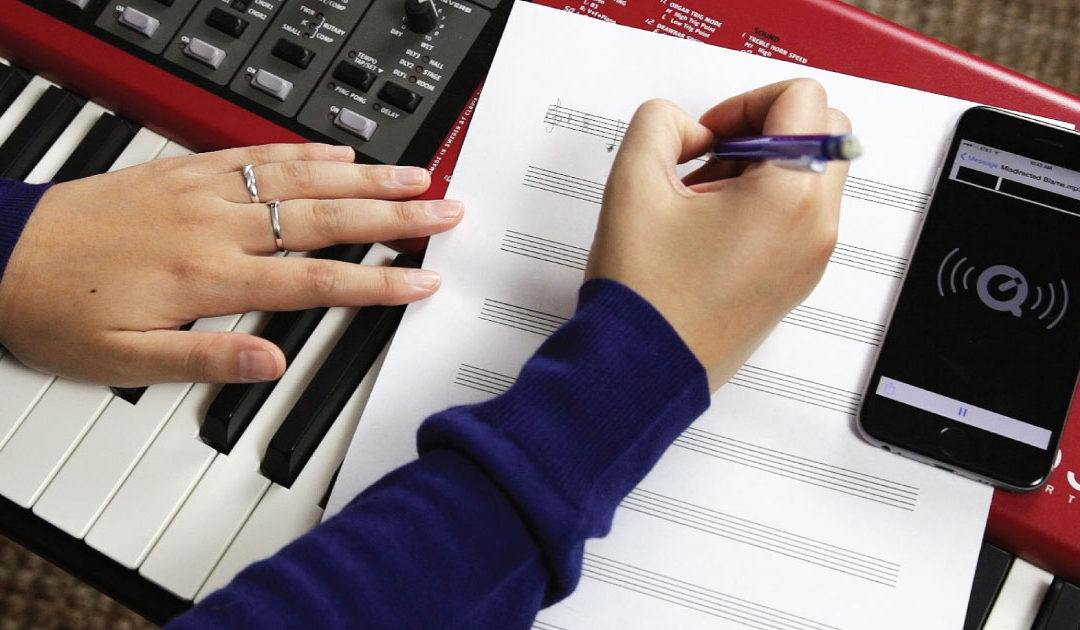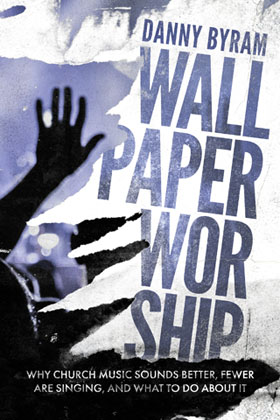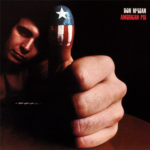
by Danny Byram | Jul 27, 2018 | Church Leadership, Music & Songwriting, Worship

Recently an acquaintance in my men’s group, an accomplished guitarist who teaches public school, shared his elation to have passed the “audition process” to play in his church’s worship band. However, he had a look of uncertainty when he shared with me what he was experiencing.
First, he is having to learn to play his instrument through an “in-ear monitor,” an earplug that plays back all the instruments on the platform. In-ears, as we call them, are valuable when there are many musicians trying to hear themselves from open floor monitor speakers. The stage noise gets so loud it interferes with the house mix. In-ears are a good solution, but take some getting used to.
Next, he was having to learn to play to a “click track”, an electronic metronome pumped through his in-ear monitor. These are used when musicians struggle to stay in tempo, traditionally a problem with non-professionals. Instruments begins to conflict and compete, as singers, guitarists and keyboardists tend to rush tempos, while the drummer and bass player are trying to hold tempos at bay. My friend also stated he was forced to mimic a keyboard part, imported through the internet, which was being heard by the congregants through the house mix. Finally, he shared a new requirement coming down: players have to spend their home hours memorizing 5-6 song charts per week, many of which are rarely repeated after the first performance.
Hearing him talk, I was assuming he was in a church that seated 2,000 or more. Not so. His church gathers 200 people weekly.
He came to his church team simply wanting to play music and assist in leading his fellow congregants into a musical worship experience that was warm, meaningful and fun. Instead what he has found was a process rife with anxiety, pressure and perfection. It seemed disconnected from the congregants, disingenuous, and a hassle. He put away his guitar and dutifully took a congregational seat to “let the pros” do it for him. The pros are hired musicians, not involved in his church.
I hear stories like this regularly. Somewhere, someone or some “worship-industry company” came up with the idea that this should be the model for small local-church music. Much of our millennial generation of worshippers know nothing else. As one who has performed for and produced large events, these technical tools can be necessary for helping professionals perform in a way that is more seamless. I get that. But who told these small churches that they are arenas or stadiums? Who told these music worship pastors they have to drive their volunteers into a world of professional gear, technique and prowess for which they are unprepared, nor possess the time to develop? For years, many larger churches have given up on using volunteers and simply hire outside music professionals. The small churches, like my friend’s, are following suit.
The important question: Is all this necessary for congregants to experience God’s presence together?
Worship leaders, who desire to pastor good-hearted, talented volunteers would do well to consider: is what I am doing real or is it rote?
ROTE: “A routine, fixed, habitual, or mechanical course of procedure; proceeding repetitiously, without meaning.”

by Danny Byram | Jun 22, 2018 | Church Leadership, Music & Songwriting, Worship, worshipmusic
As a songwriter, I have subscriptions to online periodicals that keep me updated on what’s going on in the songwriting and recording industries. One publication sends out a monthly notice of recording artists and companies looking for new song material of all genres. Recently a request came through that caught my eye. It was for a group looking for new songs for their upcoming Christian recording. The description of the kind of song they are looking for read: “Uplifting Christian with solid beat. Lyrics must not contain Bible references or Jesus or God.”
My first thought was this cannot be serious. That’s like asking for love songs that don’t mention love. Then, other thoughts emerged: do consumers of “uplifting Christian music” understand a phrase like that as self-contradicting? Do Christian consumers know this is going on prior to the release of what they are hearing played on the radio?
After attending a local megachurch service, I evaluated the songs performed by the band on the platform. There were songs that spoke clearly of Jesus and contained direct scriptural phraseology. There were also songs that could have been used in any context, with any religion that professes a positive tone (Buddhist, Baha’i, Shinto). The lyrics were uplifting, the beat was “solid,” but no reference to anything that was exclusively Christian.
Those of us who grew up in the origins of what became known as Contemporary Christian Music remember well when Christian music started receiving secular radio airplay. Most of those songs that passed the “airplay audition” were toned down in religious-speak to give a positive message with a veiled Christian meaning, so as to gain access to a wider audience. At the time, some staunch consumers of Christian music were offended, boycotting artists who released such songs. But the industry’s purpose was accomplished: put Contemporary Christian Music into the mainstream marketplace and let the listeners decide if it’s acceptable.
Today there is a much more specialized genre within Christian music: Worship. This genre title supposedly denotes songs that speak of one’s intimate response to the Object of Worship, namely God the Father, God the Son, God the Holy Spirit. To call a song a “worship song” implies perhaps that it has more substance than simply a song about love and grace, albeit God’s love and grace. A “worship song” categorically qualifies lyrically to be used within corporate worship contexts by its: a) declaration of God’s works or attributes (News Flash: we get those in the Bible); b) response of humankind to His works or attributes; or c) ability to express devotional reflection of how His unique attributes, works, and divine Self (yes, it’s a good idea to name Who we are worshiping) has transformed one’s life.
When songs presented in a worship service possess no lyrical references to God, Jesus or scripture, is it fair to assess, sweet as the song may be, that it may not qualify to be called “Christian” much less “Worship?” There is a lot of good music out there – and a lot of uplifting songs in many popular genres, and many that are written by songwriters who happen to be Christians. God bless them! Yet, those who lead crowds from church platforms would shepherd their sheep well to be careful in choosing songs that are worthy of being used within a worship context. Everything called “Christian” may not necessarily be; everything called “Worship,” ditto.

by Danny Byram | May 19, 2018 | Worship
Growing up in Air Force base chapels, the music was primarily the hymns of the 18th and 19th centuries. As the Jesus Movement of the 70s took the nation by storm, there emerged what became known as the “praise chorus.” These were short, simple, memorable songs written without the theological/story-telling length of most hymns. Praise choruses were fresh and represented the expression of a young generation of Christians.
These songs were actually not a new phenomenon. There were similar chorus-songs hanging around from the 1920s: “Turn Your Eyes Upon Jesus”, “God Will Take Care Of You”, “God Is So Good.” The choruses of the 70s, 80s, 90s seemed to possess the same sticking power: “He Is Lord”, “I Love You Lord And I Lift My Voice”, “Alleuia”. They became staples for the decades that have followed.
In the mid-late 1990s, when I was directing program for the Promise Keepers stadium events, we called these “hip pocket songs.” We would spontaneously pull one out of our hip pocket. Everyone sang them because these songs were widely known across denominations, musical traditions, races, and age groups. Here’s how we used hip pocket songs.
Throughout the program, our bands, singers, and choirs would use a variety of songs: the most recent contemporary worship songs – hymns arranged for contemporary sound and rhythm and black gospel repertoire. The idea was to musically appeal and capture the wide demographic of believers attending these massive events.
Occasionally our worship leader would walk to the edge of the stage, motion the band to quiet down, and simply lead a hip pocket song, acapella or with one guitar. Attendees would sing loudly, heartily, and many would break out in tears, simply because it was the first time they could hear nothing but the sound of the human voice in unison. Hip pocket song lyrics were never put on the screen. It was a moment of spontaneity, emotional and spiritual.
What are the hip pocket songs of today? Because decades have passed and thousands of new songs have come and gone, many of the old hip pocket songs are no longer known. Yet, there are some that will never die and can be highly effective.
Recently, our daughter-in-law Carly was leading her church of 400 in musical worship. She had taken over the leadership position in an atmosphere where the stage had been occupied by hired pro musicians because the music was so demanding and the performance highly technical. Oddly, a third of the congregants would walk out to have coffee in the lobby, waiting for the band to stop performing so they could come back in to listen to the teaching. The Sunday Carly led, she chose songs she knew everyone was familiar with. No one walked out. At the end, she pulled out a hip pocket song: The Doxology. No charts, no big radio-airplay-sounding-musical-arrangement, no click track, no lyrics. Just singing. Following the service she and the band were mobbed by congregants: “This was the best time in worship we’ve ever had…thank you!”
Creating an atmosphere for participation is not rocket science. Familiarity is key. A hip pocket song can make the difference between what seems rote and what becomes real. Talk to your singers, pastors, congregants and find out what hip pocket songs they know and love that would be effective in your situation.
What’s in your pocket?

by Danny Byram | Apr 25, 2018 | Church Leadership, Worship
Last fall I returned to the Republic of Korea (my 12th time) to provide music for two Army Chapel sponsored men’s conferences entitled “Spirit Warrior” (SW). SW is patterned after 1990s Promise Keepers (PK) men’s events. The atmosphere is exclusively masculine. The food consists of wings, pizza, hoagies, chips, sodas with 143 packages of Double Stuf Oreos, all served on paper plates, no doilies. Napkins are optional. Men’s events are messy, high carbs, no cologne. But something unique happens when guys set aside a Saturday of sports to assemble around music, preaching, prayer and personal interaction. Men can be emotional, sensitive and spiritual.
Having served as Senior Program Director for PK in the 1990’s, these kinds of events are very familiar. Along with topical men’s messages (husband/father/integrity) one of the unique characteristics of PK events was they drew men from all races, denominations and walks of life – and encouraged the men to cross over those lines to build relationships. Great idea, but the challenge was as soon as the men left for home, the diversity they experienced at the PK event was fleeting. Everyone would return to churches with people who looked like them (race), talked like them (denomination) and lived like them (walks of life).
This event in Korea was attended by Asians, Hispanics, Iranians, Blacks and Whites, as well as Koreans. Since the non-Koreans live in a foreign culture, they left the event and returned to chapels, churches and neighborhoods that not only display diversity but serve as a refuge in a surrounding culture of unfamiliarity.
The morning I was leaving Korea, I had checked out of my hotel and was finishing breakfast in the café. An Army Master Sergeant in uniform approached my table. He was in his early 40s, a handsome black American, eyes filled with positive energy and a strong handshake. I remembered seeing him at the SW event. I rose from my table as he gave me a big “man hug.” I asked him how much longer his tour in Korea was to last. He indicated he would be going back to the states in the spring. Then, his smile began to drop when he said, “Church here in Korea has been the highlight of my tour. I dread going back to church in the US. If I don’t go to a black church my own will ostracize me and my family. If I go to a white church, I will be stared at as strange. Yes, I will miss doing church overseas. It’s a foretaste of heaven.”
I stood there in the restaurant stunned at his words. Having spent two weeks in his environment, I knew exactly what he was talking about. There is a freedom and diversity in overseas churches that is rare in the USA. Doing church overseas is different from doing church in the USA because the overseas church: a) is a safe refuge; b) it is naturally diverse; c) it is the core to being connected in community amidst cultural unfamiliarity; therefore it is essential to one’s spiritual survival. It is unlikely to find a church overseas full of people that look, talk and act like you!
That breakfast conversation caused me to examine myself and ask: Is attending my church a refuge? A refuge from what? Do I feel my church experience is absolutely essential to my life? Considering the passion with which Christianity is lived out in overseas churches by Christians who live as foreigners, these questions are worth consideration. This brother is dreading to return to church in his home nation because he knows what he will find: the familiarity of familiarity; the routine of viewing God through the same lens, by the same people, of the same race, with the same vocabulary, from the same culture. I’ll take the vibrancy of overseas church any day over that.
Now may the God who gives perseverance and encouragement grant you to be of the same mind with one another according to Christ Jesus, so that with one accord you may with one voice glorify the God and Father of our Lord Jesus Christ.
– Romans 15:5,6












